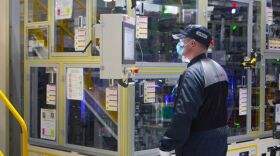The international union called KTP workers to strike Wednesday evening, putting about 8,700 employees on the picket line.
Ford is one of Louisville’s biggest employers. UAW Local 862 represents around 12,000 workers at KTP and the Louisville Assembly Plant, and Ford employs an additional 700 non-hourly workers at the plants, according to the company’s website.
KTP produces Ford Super Duty, Ford Expedition and Lincoln Navigator vehicles. In May, Ford CEO Jim Farley called it the company’s most profitable global plant.
Local 862 President Todd Dunn said Thursday morning that he expects the Louisville Assembly Plant (LAP) to have to shut down within the next day and a half because KTP provides valuable stamping services for parts LAP uses.
It’s unclear how that would affect worker compensation at LAP.
Dunn said workers will be prepared to return to KTP once a contract is reached with the company.
“We're going to build quality trucks again, and we'll be working our butts off, you know, to make up for what we lost when we get a tentative agreement,” he said
But he added that the union is looking for a contract that would benefit both their workers and other workers across the country.
“It's about our future. And it's everybody's future,” Dunn said.
A KTP worker named Joe, who declined to provide his last name, said he’s been at the plant since 2016 and works on vehicle doors and speakers.
While picketing outside the facility, he said his biggest priority for a new contract is seeing wages increase by around 40%, a major UAW goal.
“It’s time for the UAW to return to having real buying power in this country. You know, people talk about the collapse of the middle class, and it started with us,” he said.
Joe added that he’s prepared to strike for months on end if necessary.
“The strike isn’t what we want, but it’s what we have to do, and what we need to do to get economic justice,” he said.
Dunn said that workers at the Kentucky Truck Plant are expected to be on strike for one four-hour shift each week.
The UAW has been on strike since Sept. 15 against the country’s legacy automakers: Ford, Stellantis and General Motors, also known as the Big Three. That’s when the union’s four-year contracts with each company expired without new tentative bargaining agreements in place for workers to vote on.
Over the past month, the UAW has been gradually calling on workers to walk off at more facilities, as a way to put bargaining pressure on the automakers. While the union and Ford have made progress over multiple demands, KTP is now the company’s third plant to join the strike.
In a press statement, Ford called the strike at KTP “grossly irresponsible” and argued the company had offered a record contract.
“Ford made an outstanding offer that would make a meaningful positive difference in the quality of life for our 57,000 UAW-represented workers,” company officials said.
In a video posted on social media Wednesday, UAW president Shawn Fain claimed that Ford presented the union with the same four-year contract offer that it had made two weeks earlier.
This story has been updated with additional information.





